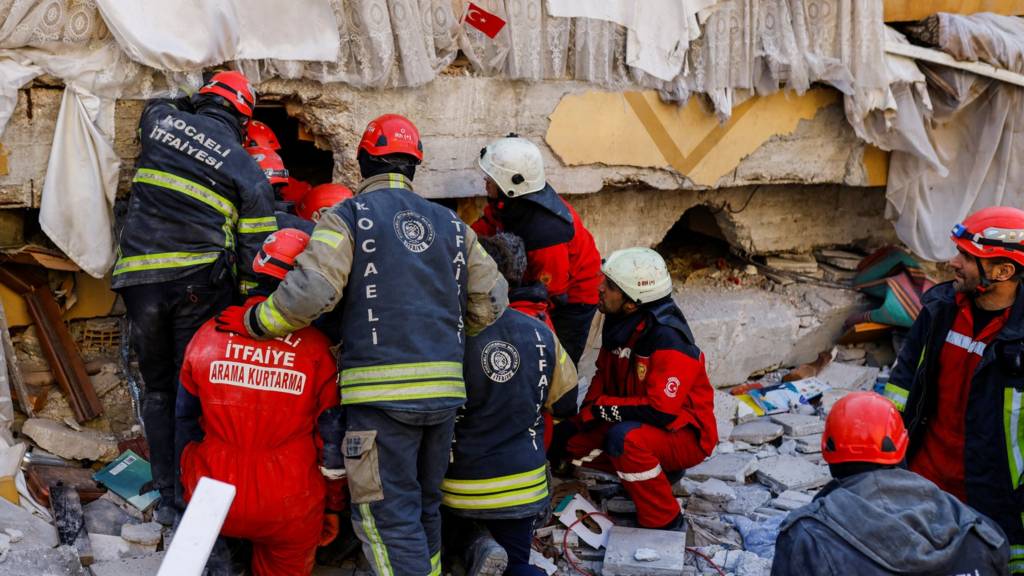
Survivors found five days after quake as death toll passes 25,000
Updates from BBC correspondents on the ground: Assaf Abboud in Aleppo, Nick Beake in Gaziantep, Quentin Sommerville in Syria, Lyse Doucet in Osmaniye, Tom Bateman in Adana, and Alice Cuddy in Iskenderun
Related Video and Audio
RTL
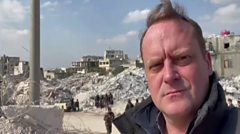
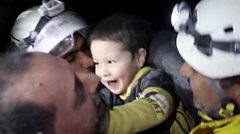
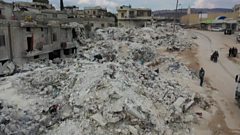
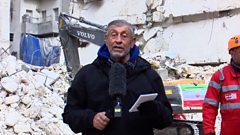
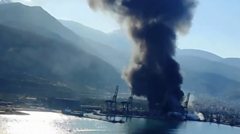
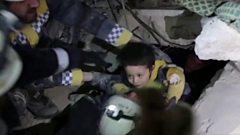

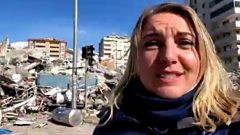
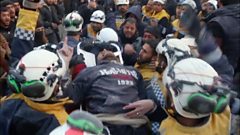
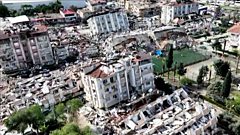


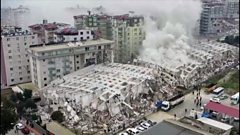

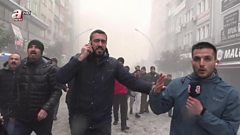
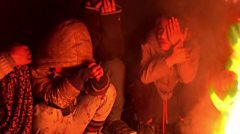
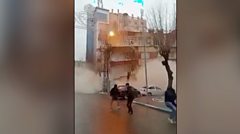
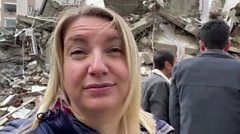

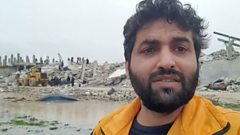
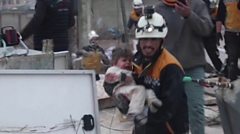

Live Reporting
Edited by Jeremy Gahagan and Marita Moloney
All times stated are UK
Get involved
UK aid appeal raises almost £53m
The UK's aid effort to held survivors of the earthquake in Turkey and Syria has reached more £52.8m ($63.7m) in two days.
The appeal by a collection of aid agencies was launched by the Disasters Emergency Committee and broadcast on television on Thursday evening.
The donations include £5m from the government, with the rest coming from the British public.
The British Red Cross, Oxfam and ActionAid are among the charities to have joined together to raise money for the many injured and homeless, whose lives have been devastated by the natural disaster.
“We’re incredibly grateful to the British public for their hugely generous response to this horrific disaster," said DEC Chief Executive Saleh Saeed.
“Compassion comes in many forms, but we are urging people to donate money rather than things. What people in Turkey and Syria need today may not be what they need tomorrow and giving cash means that DEC charities can get help to people quickly and provide a wide range of support over a longer period of time."
Death toll exceeds 24,500
The death toll in Turkey following Monday's earthquake has risen to 21,043, according to the country's President Tayyip Erdogan.
Some 3,553 people are reported to have died in Syria, according to the AFP news agency, bringing the combined number of deaths across both regions to 24,596.
Teenage boy rescued from collapsed building after 128 hours
More miraculous rescues are still taking place today - five days since the earthquake struck Turkey on Monday.
In Hatay, a 13-year-old boy is reported to have been pulled from the debris after surviving 128 hours in the rubble.
Pictures showed Arda Can Ovun being stretchered out of a collapsed building this morning as rescue efforts continue in the region of southern Turkey devastated by the 7.8 magnitude quake.
Traumatised children in Aleppo think ground is still shaking - aid worker
A British-Syrian helping with the humanitarian effort in the Syrian city of Aleppo has said the minimum amount of resources needed to support to rescue effort are extremely limited.
The government-controlled city, which was already devastated by the country’s 12-year-long civil war, was one of the areas hit by Monday's earthquake.
Wisam Afisa, who teaches with a British company in Beirut, is helping aid workers to support the families suffering the consequences of the quake.
He said families are sitting in parks over fears that their buildings could collapse and he's been trying to reassure "terrified" children who, traumatised from the earthquake, still feel like the floor is shaking.
As for the local hospital. it's packed and chaotic with medics working day by day as they "are short of everything", Afisa told BBC Radio 4's Today programme.
He added that the "minimum support you need" to carry out the search and rescue operation is "very limited" in Aleppo.
"From the beginning since the earthquake, they have so many limitations and there are very small abilities for the teams here," he says.
"We have limitations with bulldozers, with fuel, electricity is a big issue here too – at night when they’re trying to rescue people from the buildings they’re using car lights."
Inside Syria: It's as if all help ends at the border
Quentin Sommerville
Reporting from Harem, Syria
The earthquake was untroubled by borders, but for the relief effort it was an entirely different story.
This is the town of Harem in Syria - they lost about 700 houses here.
There's machinery behind me, but in the few hours I've been in Syria I've hardly seen any of that. In five minutes in Turkey, I've seen far more than I've seen in my entire time here.
People are just sitting around in the ruins. We passed some tents earlier where people have taken shelter, they've also taken shelter in a local mosque.
In rebel-held Syria, where I am now, there have been about 2,300 deaths. The stunning thing really is that the Turkish border is nearby, but it's as if all help, all aid, ends at that border.
When we crossed, there were some tankers bringing in fuel for the heavy machinery, but actually there were more people leaving, more injured Syrians, more people carrying corpses, than there was aid going in.
They're saying now, that in this town and others in the region, it's too late for aid.
They've stopped the recovery efforts, they're not finding any more bodies, no more rescues going on. The situation is they are now moving away this rubble.
Pet birds found among the rubble
Budgerigars have been found by rescuers searching through collapsed buildings.
Popular as pets, these birds were found among the rubble in Hatay, southern Turkey,
Tremors a reminder of danger to quake survivors
Lyse Doucet
Chief International Correspondent, in Turkey
It’s crisis among crisis among crisis, the way the UN describes is as a humanitarian disaster on top of a humanitarian crisis.
Right now you feel the intensity of this moment – Gaziantep where we are now is about an hour and a half from the epicentre of this deadly earthquake
Today at dawn it was bright, clear and very cold, we just felt a tremor – the hotel shook slightly – but it was a reminder of the danger for earthquake survivors all across this swathe of southern Turkey and across this sprawling city that has been home to so many refugees from across the border in Syria, also Afghan refugees.
Even the buildings still standing, many of them have been abandoned because they’re now marked with long, deep cracks and they could still collapse.
As we drive through the streets, we didn’t see a single shop open.
Gaziantep has turned into a relief hub, there are rescue teams and relief missions arriving around the clock from around the world
Last night late into the night we spent hours watching the rescue teams still at work.
'It’s hard to imagine a more complex emergency', says UN spokesman of Syria
More now from Stéphane Dujarric, spokesman for the UN Secretary General António Guterres, who says "it’s hard to imagine a more complex emergency" than in Syria right now.
"You are dealing with an almost once in a lifetime earthquake hitting a country that has been in conflict for 12 years where, already before this humanitarian emergency there was a longstanding humanitarian crisis with more than four million people needing aid," he tells BBC Radio 4's Today programme.
"A lot of the infrastructure is either destroyed or damaged, that includes roads or bridges.
"Layered on top of that you have a very challenging security situation and you have areas where we have to negotiate access between the government and between rebels. All of that in the middle of winter."
He adds that the UN has also lost two staff working in the region to the disaster.
“The humanitarian structure that was in place in southern Turkey and in north-west Syria was also hit by the earthquakes, our own staff have been hit," he says.
UN 'working as quickly as possible' to get aid to rebel-held areas in Syria
A spokesman for the UN secretary general says now is the time "to put all politics aside" in delivering aid to regions in Syria devastated by Monday's earthquake.
Stéphane Dujarric says the UN is "working with all the parties to get the aid through" to government and rebel-held areas in Syria and is "not interested in political finger pointing".
It comes after Syrian state media said the government there has approved the delivery of emergency aid to rebel-held parts of the country.
Dujarric tells BBC Radio 4's Today programme that aid workers from the UN are trying to get more aid into rebel-held areas "as quickly as possible", adding that the organisation "stands with the people of Syria whether they live in rebel-held territories or whether they live in government-held territories".
Responding to criticism from the the White Helmets rescue group that the UN botched its response in rebel-held areas of northwestern Syria, Dujarric acknowledged their frustration.
"If I was standing in the middle of devastation and my community had been hit, I would be unhappy and critical because aid never comes quickly enough," he says.
“We are extremely aware of the suffering of the people of Syria," he adds, stating that "solidarity" is what's needed as the rescue efforts continue.
Further aftershock reported
Within the past hour our BBC colleagues in Turkey have reported an aftershock occuring in the city of Gaziantep.
The the US Geological Survey shows that particular shock had a magnitude of 4.5.
Aid workers 'seeing immense need in Turkey and Syria'
The level of need in earthquake-hit Turkey and Syria is "immense", the head of the UK's Disasters Emergency Committee (DEC) has said.
Saleh Saeed said the DEC - an umbrella body of 15 UK charities - has seen an "incredible" response to its Turkey-Syria Earthquake appeal, with more than £30m raised in one day.
The funds have already been used to provide immediate essential aid in Turkey and Syria, he said.
But the need in both countries has been "immense" and scaling up the response has been a "mammoth task".
He said essential services in northern Syria, such as healthcare, were already struggling before the quake hit and the disaster has "amplified and made the situation hugely worse".
He told BBC News:
Woman and child rescued after 115 hours in rubble
Despite hope fading that a significant number of people will be rescued from the rubble, moments of miraculous rescues are still emerging from the region.
Five days since the first 7.8 magnitude tremor struck Turkey in the early hours of Monday morning, people were still being pulled from the rubble alive.
Video footage uploaded to social media showed the moment a pregnant woman and her young daughter were stretchered out of a flattened building in Turkish city of Gaziantep after surviving for 115 hours.
There have also been reports of several people being rescued across quake-struck areas in Turkey after 110 hours - including a teenager.
Video from a German disaster response organisation reportedly showed a girl being pulled alive from the rubble in Kahramanmaras after being trapped for more than 110 hours.
Turkey's Humanitarian Relief Foundation also released video showing a man being stretchered from the wreckage to a nearby ambulance.
Incredible stories of survival days after quake struck
Nick Beake
Reporting from Gaziantep
Against all odds, there are still remarkable stories of survival.
Late last night in the devastated Turkish city of Kahramanmaras, British and German rescuers found - and then pulled to safety - a 15-year-old girl.
But reports of such escapes after all these days are now few and far between.
The focus has been moving to those in requiring food and shelter, with the United Nations warning more than 870,000 people are now in urgent need of hot meals across Turkey and Syria.
In Syria alone, it’s feared up to 5.3 million may have been made homeless.
Only two aid convoys have reached rebel-held areas and the UN's humanitarian chief has told the BBC an immediate ceasefire is needed in Syria to allow help to reach everyone.
Death toll exceeds 24,000 in Turkey and Syria
Good morning and welcome back to our live coverage of the earthquakes that struck Turkey and Syria six days ago.
More than 24,000 people are now known to have died in the disaster, including 20,665 in Turkey and 3,553 in Syria, according to figures from the AFP news agency.
Millions are thought to be homeless in the region and rescuers are increasingly focusing on those requiring food and shelter.
The UN's humanitarian chief said only two aid convoys had reached rebel-held areas in Syria, and he called for an immediate ceasefire to allow help to reach everyone.
Stay with us we bring you the latest updates throughout the day.
What's been happening?
Rescue crews in Turkey and Syria are continuing to search beneath the rubble for survivors of Monday's devastating earthquakes, with the death toll now approaching 24,000.
We'll be pausing our coverage shortly, but before we do, here are the latest developments:
You can continue to read about the earthquakes here - including on the ground reporting from the BBC's Assaf Abboud in Aleppo, Syria.
Today's coverage was written by Malu Cursino, Oliver Slow, Anna Boyd, Alys Davies, Aoife Walsh, Laura Gozzi and James Harness.
It was edited by Marita Moloney, Nathan Williams, Alexandra Fouché and Marianna Brady.
'Government didn't listen to earthquake warnings'
Turkey's government had not made adequate preparations for Monday's devastating earthquake despite warnings from experts, an opposition party in the country has said.
The Peoples' Democratic Party (HDP) vice chair Hisyar Ozsoy said people are "very angry" at the state institutions because they are "so ineffective".
He accused the government of being ill-prepared for the disaster and said rescue missions were late and "couldn't manage the whole process".
"Yes it is true that this is a very, very big earthquake, it's a very vast area that is true," he told BBC Newshour.
"But despite warnings of scientists and geologists who were saying that an earthquake is going to happen, we saw that actually there has been almost no preparation."
Death toll approaches 24,000 in Turkey and Syria
The death toll in Turkey after Monday's catastrophic earthquakes has risen to 20,213, the country's health minister said.
At least 3,553 people have died in Syria, bringing the combined total of fatalities to more than 23,700.
It comes as the United Nations rights chief called for an immediate ceasefire in Syria to allow the delivery of aid to the region.
"At this terrible time in Turkey and Syria, we call for urgent delivery of assistance to ALL in need," the UN rights office said.
'Rescue teams have yet to reach our village'
Nafiseh Kohnavard
BBC Persian, in Antakya
I've been talking to Alaa and Ahmed, who have been searching for their friends and family amongst the rubble in Antakta, Turkey (see our previous post).
Alaa and Ahmed are from Aleppo, but they fled from Syria's civil war to Antakya in 2012.
They've been telling me how badly their loved ones on the other side of the border in Syria have been impacted by the earthquakes.
With a lump in his throat, Ahmed said: "The situation on that side is worse than here but not much news is coming out.
"We know because a friend was able to reach us saying that many houses including our family’s have been devastated and many are still under the rubble. No rescue teams have reached our village in Aleppo."
The area where Alaa and Ahmed's friends and families live is under the control of rebel factions opposed to Syria's President Bashar al-Assad. International aid agencies have only been able to reach this area via a crossing from Turkey.
The first UN aid convoy crossed the border three days after the quake, but that didn't include search and rescue teams.
Alaa and Ahmed told me that they are planning to go back to Syria but first they want to find their friends here in Antakya.
I texted Alaa today to ask if they have heard about their friends. She said: "We just received news that their daughter was rescued and sent to a hospital but we haven’t been able to find her yet. We will keep searching."
'They survived the war, I pray they survive this too'
Nafiseh Kohnavard
BBC Persian, in Antakya
I met Alaa and his friend Ahmed a couple of nights ago while embedded with a search and rescue team in Antakya, Turkey. This city has seen the worst of the damage from the two earthquakes.
They were from Aleppo and had fled in 2012 to Antakya from Syria’s civil war. Alaa and Ahmed were searching for their friends, a family of four whose house had been flattened.
Alaa asked the commander of the rescue team to help them to find their friends.
The family's neighbourhood was totally destroyed so it was hard to locate the alley ways they were in. All the alleys were covered and blocked by the rubble.
Alaa told me that their friends had escaped the Syrian regime's bombardment twice before fleeing to Turkey.
She said:
Spotlight on humanitarian crossing points into Syria
BBC Monitoring
A delay of nearly three days in international aid delivery to rebel-held north-western Syria has put the spotlight on humanitarian crossing points into Syria and which forces control them.
Some of these crossings are on Syria's northern border with Turkey - itself badly hit by the quake.
Meanwhile, aid shipped by air arrived relatively swiftly in government-held territory from allies and prospective allies of the Assad government regionally and beyond.
Syria's border area with Turkey is divided into separate zones of control.
In the north-west, Idlib province is controlled by the militant group Hayat Tahrir al-Sham. The other two areas are held by Turkey-backed factions in the north, and the Kurdish-led Syrian Democratic Forces operating in the north and east.
There were previously at least 10 border crossings between the two countries but in recent years only a few have remained in operation.
Control over internal crossings connecting areas inside Syria is also divided between the government, HTS, Turkey-backed factions and the SDF.